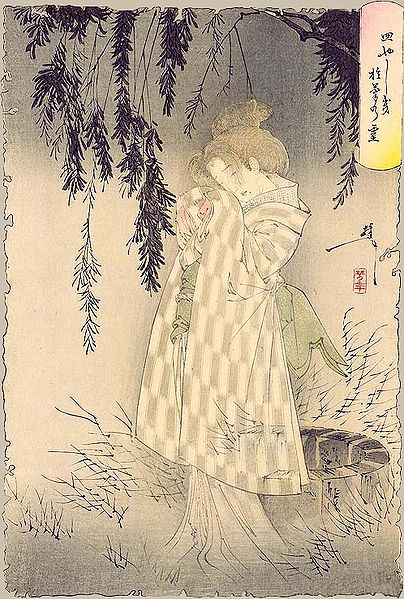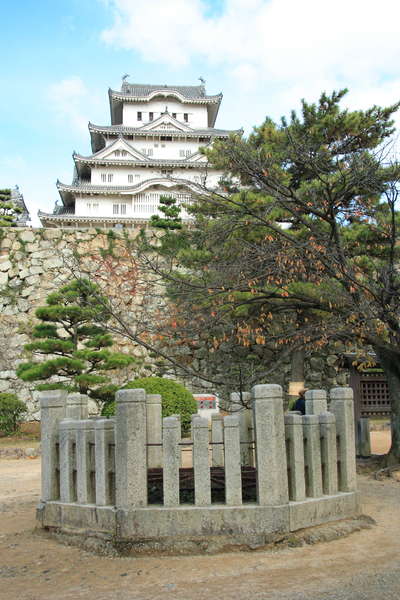| |
Unexplained Mystery of Okiku's Well Ghost |
|
Source: http://en.wikipedia.org/wiki/Banch%C5%8D_Sarayashiki
 |
|
There are three types of ghost in Japan: obake, youkai and yuurei. Obake literally means “transforming thing” and it can be used to generally refer to anything weird or grotesque. Yokai literally means “bewitching apparition” and they include monsters, goblins and ghouls. Unlike yuurei, which are souls of the dead and “downright scary”, yokai are comical, bizarre and michievous in some way.
Yuurei, is the soul(reikon) of someone wandering around seeking revenge. This is because the person died either by murder, slain in battle, suicide, or the person hasn’t been given an appropriate funeral.
Often said to be haunted by the ghost of Okiku. She is supposed to rise from the well at night and count to nine before shrieking and returning to the well. The ghost story of Okiku, an unfortunate servant maid, is one of the best known and was transformed into a Kabuki play and numerous novels.
Some stories, however, locate the haunted well in the Canadian embassy in Tokyo's garden.
There are different versions of the ghost story of Okiku. What they all have in common is the description of her ghost coming out of the well and counting from one to nine and then breaking out into a heart-rendering sobbing.
In another version, Okiku really breaks a plate and is killed by her master and her corpse is thrown into the well.
In yet another version, it is the wife of Aoyama, who breaks the plate. To hide her guilt, she throws the broken plate into the well and accuses Okiku of having it stolen. In this version she is also killed by her master for punishment and thrown into the well.
There is also an alternate version for the end of the story. To stop the nightly sobbing, a friend of the family of Aoyama is hired. He is hiding at the well during the night and after Okiku had counted from one to nine, he is stepping forward shouting loudly "ten". From then on the ghost of Okiku was never seen again.
In Japanese culture, ghosts take on many different forms. Yuurei are ghosts whose deaths came about so suddenly that they did not have time to make their peace, either because they were murdered or committed suicide rashly (defeated warriors in Japan were often forced to commit suicide). This is the tale of a woman who was so deeply wronged in life that, after more than four hundred years, her soul remains hostage to the agony of the betrayal that killed her. Himeji Castle is an imposing wooden structure, extremely well preserved despite its age. It stands on an elevated position in the center of town of Himeji, thirty miles west of Kobe. The castle's earliest origins are in the early fourteenth century, but it is in the seventeenth century, at a time when the local Shogun government commissioned the tower to be built to its five-story height, that this story is set. At the foot of the tower, known as the Donjon, and located next to the Hara-kiri Maru (the Suicide Gate), where people were forced to commit ritual disembowelment stands the castle well. Its proximity to the gate is no mere coincidence; it was not a source of drinking water, but a means of washing away the blood of a hara-kiri suicide. Today it is known as Okiku's Well.
There are different versions of the ghost story of Okiku. What they all have in common is the description of her ghost coming out of the well and counting from one to nine and then breaking out into a heart-rendering sobbing.
The story of Okiku is an old one, whose true origins are unknown; however, it first appeared under the title Bancho Sarayashiki in July 1741 at the Toyotakeza theatre. In the kabuki play Bancho Sarayashiki, Okiku is a maid at the mansion of the Japanese samurai Tessan Aoyama. The samurai wants to seduce the cute girl but she rejects his advances. Aoyama uses a trick. He hides one of ten valuable Dutch plates and threatens Okiku to make public that she had stolen the plate unless she agrees to become his mistress. In her desperation Okiku throws herself into the well and drowns. Okiku's ghost comes out every night, counting from one to nine and then breaks out into a terrible howling and sobbing. Finally Aoyama goes insane by the daily apparitions at night.
Folk version
Once there was a beautiful servant named Okiku. She worked for the samurai Aoyama Tessan. Okiku often refused his amorous advances, so he tricked her into believing that she had carelessly lost one of the family's ten precious delft plates. Such a crime would normally result in her death. In a frenzy, she counted and recounted the nine plates many times. However, she could not find the tenth and went to Aoyama in guilty tears. The samurai offered to overlook the matter if she finally became his lover, but again she refused. Enraged, Aoyama threw her down a well to her death.
It is said that Okiku became a vengeful spirit who tormented her murderer by counting to nine and then making a terrible shriek to represent the missing tenth plate – or perhaps she was tormented herself and still trying to find the tenth plate but crying out in agony when she never could. In some versions of the story, this torment continued until an exorcist or neighbor shouted "ten" in a loud voice at the end of her count. Her ghost, finally relieved that someone had found the plate for her, haunted the samurai no more.

Ningyo Joruri Version
Hosokawa Katsumoto, the lord of Himeji Castle, has fallen seriously ill. Katsumoto's heir, Tomonosuke, plans to give a set of 10 precious plates to the Shogun to ensure his succession. However, chief retainer Asayama Tetsuzan plots to take over. Tomonosuke's retainer, Funase Sampei Taketsune is engaged to marry a lady in waiting, Okiku. Tetsuzan plans to force Okiku to help him murder Tomonosuke. Tetsuzan, through the help of a spy, steals one of the 10 plates, and plans to accuse Okiku of stealing the plate if she does not assist in the crime. Tetsuzan summons Okiku to bring the box containing the plates to his chamber.
There, he attempts to seduce Okiku, although she refuses due to her love for Takatsune. Rejected, he then has Okiku count the plates, and finds only nine. He blames her for the theft, and swears to lie for her if she will be his mistress. Okiku again refuses, and Tetsuzan has her beaten with a wooden sword. Tetsuzan then has her suspended over a well and, erotically enjoying her torture, has her lowered into the well several times, beating her himself when she is raised. He demands that she become his lover, and assist in the murder of Tomonosuke.
She refuses again, and Tetsuzan slashes her with his sword, sending her body into the well. While wiping clean his sword, the sound of a voice counting plates comes from the well. Tetsuzan realizes that it is the ghost of Okiku, but is entirely unmoved. The play ends with the ghost of Okiku rising from the well, and Tetsuzan staring at her contemptuously.
Okamoto Kido Version
In 1655, in Edo, a vassal of the Shogun Aoyama Harima has fallen in love with a young servant girl Okiku. Aoyama has promised to marry her, but has recently received an auspicious marriage proposal from an Aunt. Aoyama promises Okiku that he will honor their love, and refuse the proposal. Okiku doubts, and tests him by breaking one of the 10 heirloom plates that are the treasure of the Aoyama household. The traditional punishment for breaking one of the plates is death, which is demanded by Aoyama's family.
At first, Aoyama is convinced that Okiku broke the plate by accident, and pardons her, but when Okiku reveals that she broke the plate as a love-test, Aoyama is enraged and kills her. He then throws her body down a well. From then after, Okiku’s ghost is seen to enter the house and count the plates, one through nine. Encountering her in the garden, Aoyama sees that her ghostly face is not one of vengeance, but beautiful and calm. Taking strength from this, he commits seppuku and joins her in death.
The story of Okiku's Well is a key story in Japanese culture, where it is now known as Banshu Sarayashiki and has been the subject of many variations in theater and literature. But at Himeji Castle, there are still those who say they have heard Okiku's howls in the still quiet hours of the early morning. The brutality of her murder and the profound sense of betrayal she felt are still so strong that she remains imprisoned by her own earthly emotions, her soul unable to find peace until now.

Submit News/Videos/Links |
Discuss article |
Article Link
|
More unsolved mysteries on Unexplained Mysteries
|



![]()